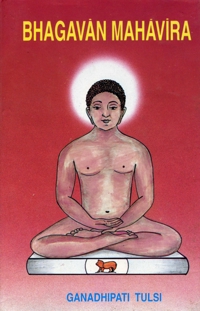 | Chapter 4 | Kaivalya (Omniscience) And The Bhagavan's Sermons |

ayubhuti was the third to come.
Bhagavan Mahavira expounded to Vayubhuti the duality of the soul and the physical body. He said,
"You are sceptical about the duality of soul and body. This is because you cannot know the subtle things by means of gross things. The human body is gross and material, whereas the soul is subtle and non-material. If they were one and the same thing, there would be no need to treat them as separate. I find through extra-sensory perception that the two are separate from each other. If the soul were not distinct from the body, I could not have seen it without the help of the sense-organs."
Then Bhagavan Mahavira resolved the doubt of Vyakta by expounding that it was wrong to believe the soul to be mere transformation of the five elements, which constitute the material universe.
Expounding the principle of the transmigration, he said to Sudharma,
"Sudharma, you hold that the soul continues to remain in the same kind of species even in the next births. That is why you believe that a man will be reborn as a man and an animal as an animal. But, that is not correct.
One is reborn as a man or an animal in accordance with his karma. A man who practises fraud, deceit and speaks untruth is reborn as an animal. On the other hand, man who is by nature gentle, meek, compassionate and without jealousy, is reborn as a man."
Bhagavan Mahavira explained the nature of Bondage and Liberation to another visitor called Mandita.
The Bhagavan said,
"Mandita, the soul becomes bound by karma. You are confused by the question whether this bondage has a beginning or not. Your contention is: If the bondage has a beginning, one has to accept anyone of the following three alternatives:
- The existence of the soul is antecedent to that of karma, or
- The existence of karma is antecedent to that of the soul, or
- The soul and karma came into existence simultaneously.
All these three alternatives are, however, unacceptable. Now if the bondage of karma was without beginning, nobody would be able to get out of it and there would be no liberation.
My dear pundita! Your confusion is because you are taking a one-sided view of things. Looked at from the point of view of anekantavada (i.e., by considering all the aspects), the relationship between the soul and karma has a beginning as well as it is beginningless.
There was no time in the past when the soul was not bound by karma. Past karmas leave their effects on the soul and present actions wrap it in new layers of karma-atoms.
Looked at this relationship as a process, it has no beginning, but looked at it from the point of view of a particular karma, it has a beginning."
The Bhagavan explained to Maurya and Akampita the nature of heaven and hell respectively.
When Acalabhrata came to see him, Bhagavan Mahavira explained to him the nature of righteousness and sinful deeds. He said,
"Righteous and sinful deeds are not fictitious. They are not governed by systems created by man. They are the products of man's natural instincts. They seize his soul."

Bhagavan Mahavira, explaining the nature of the next world to enlighten Metarya, said,
"Metarya, a thing which has no beginning and no end cannot have a middle. If you did not exist in the previous life and if you will not exist in the next life, you cannot exist in the present life also.
That which exists now must have existed in the past and must exist in the future also.
Existence can be conceived only in the light of the present, past and future. It is eternal.Whatever number of fundamental elements existed in the world in the past, exist today and will continue to exist in the future also.
Not a single particle can ever be increased or decreased.
How, then, can you also go out of existence?
The process or continuity of existence automatically leads to the next world."
Addressing himself to Prabhasa, Bhagavan Mahavira explained the nature of nirvana or the State of Liberation. He said,
"Prabhasa, liberation of the soul does not mean the end of existence. When the light of the candle goes off, the flame does not cease to exist. It only changes its state.
Liberation means a change in the state of the soul. The soul which had been changing its states and undergoing recurrent transmigration under the impact of the body and karma enters into a changeless state in liberation free from the body and karma. It becomes itself. Liberation means the attainment of its own nature and freedom from the not-self by the soul. It transmigrates no more."
After having converted the eleven scholars of Brahmanical school, Bhagavan Mahavira propounded the nature of Reality including the substances like the soul etc. on the basis of Relativism or Non-absolutism.
The contention prevailing among the different philosophers about the nature of Reality was, in fact, due to a one-sided view of things. Consequently, the polemics came into existence.
Pundits like Indrabhuti had been caught in the maze of polemics.
Bhagavan Mahavira furnished them with altogether a new approach - an approach based on anekanta (non-absolutism), which, in fact, comprised of outlook of synthesis.
All of them accepted it and succeeded in perceiving the Reality in its true perspective.
 Acharya Tulsi
Acharya Tulsi

